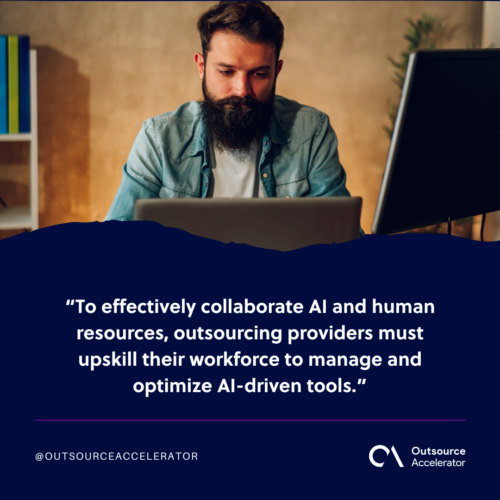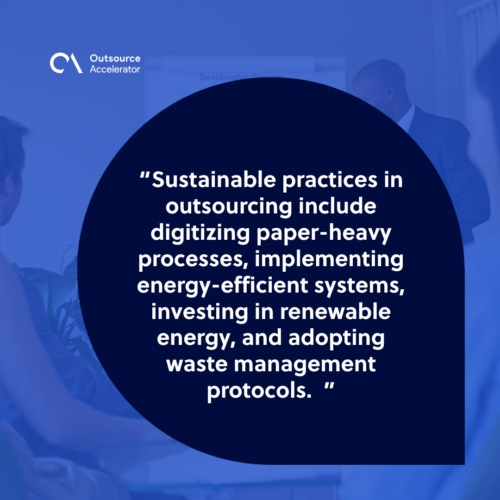The future of outsourcing: Trends shaping the industry in 2025 and beyond

Outsourcing has long been the cornerstone of business efficiency, enabling companies to reduce costs, scale their operations, and access specialized expertise. Looking into 2025 and beyond, the industry is evolving rapidly, courtesy of technological advancements, shifting work dynamics, and changes in business priorities.
Staying informed about the changes is critical to securing your business’s long-term success. Read on for the key trends shaping the future of outsourcing in 2025 and beyond and how companies can adapt to remain competitive.
I. Artificial Intelligence and automation
Artificial Intelligence (AI) is revolutionizing BPO operations and improving efficiency. A recent report by Deloitte shows that 73% of companies are switching to AI to enhance process efficiency, and outsourcing companies are at the forefront of this transformation.
Through AI and machine learning, tasks like customer support, data entry, and complex analytics will be easily handled by AI-powered systems, reducing dependency on human labor for repetitive tasks.
AI-driven analytics will help outsourcing companies respond to customer inquiries and needs proactively, predict issues in advance, and offer customized solutions. Generative AI will further support content creation, and its feedback analysis applications will help businesses refine their approaches to customer engagement.
Implications of artificial intelligence and automation in the BPO sector
- Cost efficiency – Automating BPO solutions will lower operational costs by reducing overdependency on human beings.
- Enhanced accuracy – Unlike human beings, who are prone to errors due to fatigue or handling repetitive tasks, AI will continue to process accurate data, hence delivering higher-quality deliverables.
- New skill requirements – To effectively collaborate AI and human resources, outsourcing providers must upskill their workforce to manage and optimize AI-driven tools.

II. Shift towards strategic partnerships
Traditional outsourcing models focused on cost savings are being replaced by strategic partnerships as businesses are now looking for collaborators to drive innovation and provide value-added services. A Gartner study reveals that by 2025, over 60% of organizations will include outsourcing providers in their strategic planning processes.
How strategic partnerships are impacting the outsourcing sector
- Collaborative models – Outsourcing providers now offer consultancy on business trends, helping businesses adapt to changing markets. Hence, beyond providing services, these providers are your partners in growth.
- Long-term engagements – Companies are investing in longer-term contracts to foster deeper partnerships.
- Customized solutions – Tailored services that address specific client needs are becoming the norm. Whether you want support during the busy seasons or downsize during the slow seasons, outsourcing will make it easy.
III. Focus on data security and compliance
Data security is a critical concern with the increased digitization of business processes and cloud-based services. Potential data risks include data breaches, compliance violations, and theft of intellectual property.
According to IBM, the global report of data breaches in 2023 was $4.45 million, implying the need for outsourcing providers to prioritize security measures and compliance regulations like HIPAA, CCPA and GDPR in 2025.
Implications of data security
- Advanced cybersecurity – In 2025, outsourcing providers will have to invest in innovative technologies like blockchain and encryption to ensure the maximum security of their clients’ data.
- Transparency – Clear protocols for data handling and breach response will be essential in 2025.
- Certification demands – Certifications like SOC 2 and ISO 27001 are becoming standard requirements for outsourcing providers.
IV. The emergence of nearshoring
As businesses aim to optimize their operations, nearshoring is emerging as a powerful trend within the BPO sector. This shift from offshoring is fueled by the need for better communication, cultural alignment, and faster issue resolution.
As a result, nearshoring, or outsourcing to neighboring countries, helps businesses balance cost savings with operational efficiency.
The implications of nearshoring
Agile nearshoring development
Nearshoring promotes an environment conducive to diversified business practices. With your teams closer, there is faster adaptation and flexible project management.
Nearshoring also offers a more hands-on approach to innovation and problem-solving, allowing businesses to utilize local expertise while maintaining operational continuity.
Time zone alignment
Another benefit of nearshoring is the alignment of time zones, especially for industries where prompt responses and updates are vital. Providers in the same time zone will have real-time collaboration, which is beneficial for activities that require immediate decision-making and feedback.
With such a model, there are fewer delays and improvements in the project cycle rhythms.
Reduced supply chain risks
Supply chains can suffer global uncertainties, such as the shutdowns experienced during the COVID-19 pandemic. With Nearshoring, businesses can minimize such disruptions.
V. The gig economy and outsourcing
The gig economy is rising, with McKinsey reporting that 36% of employed Americans identify as gig workers. This economy comprises individuals in freelance opportunities and short-term contracts, with platforms like Upwork connecting businesses with freelance talent worldwide. While the gig economy and outsourcing are distinct concepts, they interact in certain scenarios.
For example, a company can opt to outsource specific projects, especially short-term, leveraging their specialized skills. This way, they can access expertise without committing to a full-time employee.
Also, some outsourcing providers incorporate gig workers into their workforce to handle fluctuating tasks. With this fusion, an outsourcing company can adapt to changing demands and offer scalable solutions to its clients.
Implications of the gig economy and outsourcing
- Flexible workforce – Businesses can scale up or down based on demand.
- Specialized talent pools – Access to freelancers with unique skills enhances project outcomes as your business gains access to specialized expertise.
- Challenges in integration – When a company works with gig workers, it is its responsibility to ensure seamless collaboration between its in-house teams and freelancers, which might be challenging in certain instances.
VI. Sustainability and ethical outsourcing
With increased awareness of climate change, companies are adopting sustainability practices in their outsourcing decisions. Sustainable practices in outsourcing include digitizing paper-heavy processes, implementing energy-efficient systems, investing in renewable energy, and adopting waste management protocols.

Clients and consumers are demanding environmentally and socially responsible practices. A McKinsey report highlights that 70% of consumers consider sustainability when choosing a brand, influencing outsourcing providers to adopt green and ethical practices. By partnering with a BPO that is key to sustainability, you will also enhance your corporate social responsibility efforts and brand image.
The shift towards sustainability will intensify in 2025, and BPOs that embrace green practices will attract forward-thinking clients who want a more sustainable future.
Implications of sustainability and ethical outsourcing
- Green policies – BPO providers must adopt eco-friendly operations in 2025 to stay competitive.
- Social responsibility – Outsourcing companies must be ready to participate in social responsibility through fair labor practices and community engagement.
- Client alignment – Businesses will consider outsourcing partners that share their sustainability values to boost their overall sustainable goals.
Preparing for the Future
The outsourcing industry is always evolving, and to thrive in this landscape, businesses and providers have to embrace technology, particularly AI and automation, foster transparent and strategic partnerships, and prioritize security and sustainability.
By staying ahead of the above trends, organizations can leverage outsourcing’s full potential, driving growth and innovation in 2025 and beyond.







 Independent
Independent




